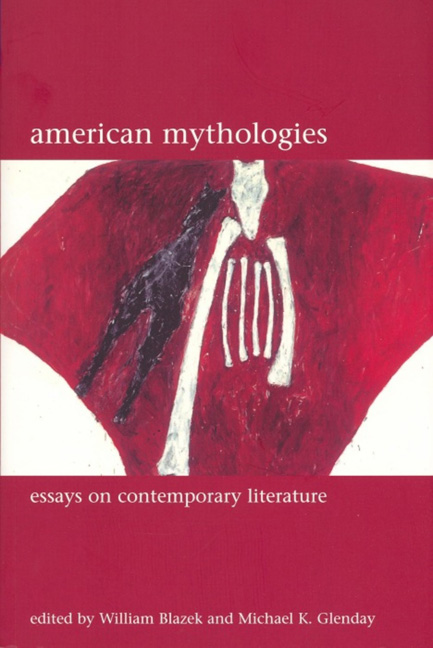Book contents
- Frontmatter
- Dedication
- Contents
- Acknowledgements
- Introduction
- 1 Indians with Voices: Revisiting Savagism and Civilization
- 2 Wild Hope: Love, Money and Mythic Identity in the Novels of Louise Erdrich
- 3 Float Like a Butterfly, Sting Like a Bee: Mythologies of Representation in Selected Writings on Boxing by Norman Mailer
- 4 The Secret Sharing: Myth and Memory in the Writing of Jayne Anne Phillips
- 5 The Individual's Ghost: Towards a New Mythology of the Postmodern
- 6 ‘Cheap, On Sale, American Dream': Contemporary Asian American Women Writers’ Responses to American Success Mythologies
- 7 ‘No Way Back Forever’: American Western Myth in Cormac McCarthy's Border Trilogy
- 8 Native American Visions of Apocalypse: Prophecy and Protest in the Fiction of Leslie Marmon Silko and Gerald Vizenor
- 9 The Brave New World of Computing in Post-war American Science Fiction
- 10 Mythologies of ‘Ecstatic immersion’: America, The Poem and the Ethics of Lyric in Jorie Graham and Lisa Jarnot
- 11 Whose Myth is it Anyway? Coyote in the Poetry of Gary Snyder and Simon J. Ortiz
- 12 Aging, Anxious and Apocalyptic: Baseball's Myths for the Millennium
- 13 Finding a Voice, Telling a Story: Constructing Communal Identity in Contemporary American Women's Writing
- Notes on Contributors
- Index
8 - Native American Visions of Apocalypse: Prophecy and Protest in the Fiction of Leslie Marmon Silko and Gerald Vizenor
- Frontmatter
- Dedication
- Contents
- Acknowledgements
- Introduction
- 1 Indians with Voices: Revisiting Savagism and Civilization
- 2 Wild Hope: Love, Money and Mythic Identity in the Novels of Louise Erdrich
- 3 Float Like a Butterfly, Sting Like a Bee: Mythologies of Representation in Selected Writings on Boxing by Norman Mailer
- 4 The Secret Sharing: Myth and Memory in the Writing of Jayne Anne Phillips
- 5 The Individual's Ghost: Towards a New Mythology of the Postmodern
- 6 ‘Cheap, On Sale, American Dream': Contemporary Asian American Women Writers’ Responses to American Success Mythologies
- 7 ‘No Way Back Forever’: American Western Myth in Cormac McCarthy's Border Trilogy
- 8 Native American Visions of Apocalypse: Prophecy and Protest in the Fiction of Leslie Marmon Silko and Gerald Vizenor
- 9 The Brave New World of Computing in Post-war American Science Fiction
- 10 Mythologies of ‘Ecstatic immersion’: America, The Poem and the Ethics of Lyric in Jorie Graham and Lisa Jarnot
- 11 Whose Myth is it Anyway? Coyote in the Poetry of Gary Snyder and Simon J. Ortiz
- 12 Aging, Anxious and Apocalyptic: Baseball's Myths for the Millennium
- 13 Finding a Voice, Telling a Story: Constructing Communal Identity in Contemporary American Women's Writing
- Notes on Contributors
- Index
Summary
Responding in part to the quincentennial of Europe's ‘discovery’ of the ‘New World’ and a cultural environment charged with millenial expectations, Native American writers such as Leslie Marmon Silko and Gerald Vizenor have ironically reshaped traditional American mythologies of apocalypse. Like Silko's Almanac of the Dead, Vizenor's Bearheart, Dead Voices, and The Heirs of Columbus utilize apocalyptic and futuristic themes to comment on cultural conflict and world-view dislocations. Yet these fictions also dramatize conceptions of time, space and causality that question the very models of linear history structuring traditional Western treatments of apocalypse and the future. Most fundamentally, all of these novels adapt aspects of Native American tradition to reinterpret the meanings of cultural apocalypse from a primarily tribal point of view.
Many of Vizenor's transformational themes are grimly parallelled in Almanac of the Dead, in which Silko evokes underlying patterns of Indian prophecy to project apocalyptic images of cultural and spiritual crisis. Similarly, in Bearheart Vizenor extends trickster tradition into a post-apocalyptic future landscape to examine the destructive effects of ‘terminal creeds’. In Dead Voices he creates a subtle apocalypse of the spirit in a contemporary setting. And in The Heirs of Columbus, Vizenor constructs a kind of parallel history narrative that cannot be located precisely in conventional Western time and space, but seems to be located in a mythic, trickster universe that interpenetrates with conventional history and ‘reality’.
Though in Western tradition apocalypse is deeply identified with disaster, it can also evoke images of transformational regeneration, and it is this aspect of the theme that Silko and Vizenor ultimately project in their apocalyptic fictions. In all four of these major Native American novels the apocalyptic theme recapitulates grim aspects of tribal experience under colonization, yet it also projects possibilities for the survival of tribal values into an emerging ‘new world’ – the imminent revolution in Almanac of the Dead, the ‘fourth world’ to which Indian pilgrims escape in Bearheart, the bizarre world of the ‘wanaki game’ in Dead Voices, and a kind of tribal utopia in the new nation established by Stone Columbus in The Heirs of Columbus.
- Type
- Chapter
- Information
- American MythologiesNew Essays on Contemporary Literature, pp. 157 - 167Publisher: Liverpool University PressPrint publication year: 2005



